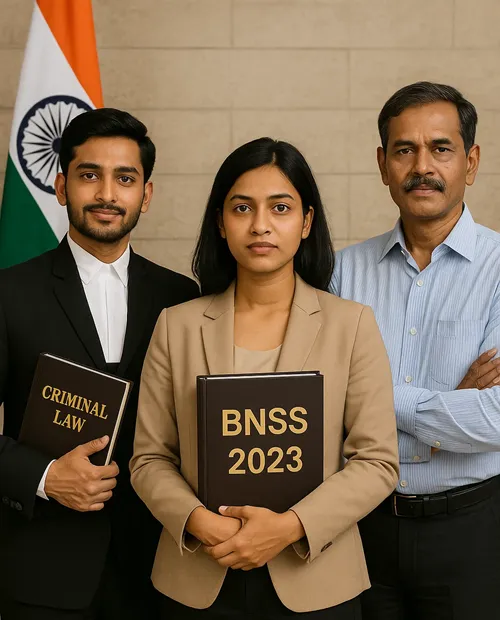
The Bharatiya Nagarik Suraksha Sanhita (BNSS), 2023 is India’s new criminal procedure law. It replaced the old Criminal Procedure Code (CrPC), 1973, and came into effect from 1st July 2024.
BNSS governs how police investigate, how courts run trials, how bail is granted, and how punishments are carried out. It aims to make the justice system:
- Faster – with fixed time limits for investigations and trials.
- Transparent – with digital case updates and recordings.
- Victim-friendly – ensuring victims get regular updates.
- Digital-first – e-FIRs, video evidence, online bail, and e-summons.
It has 531 sections and introduces modern tools like:
- Online FIR & Zero FIR (at any police station).
- Mandatory forensic evidence in serious crimes.
- Split police custody (15 days across the investigation, not consecutive).
- Digital summons and e-warrants.
- Audio-video recording of statements.
- Live updates for victims.
-
Time limits for filing charge sheets and finishing trials.
State-by-State Online FIR Filing
-
Delhi
Portal: Delhi Police e-FIR
Services: E-FIR for lost property, vehicle theft, and missing persons.
-
Haryana
Portal: Haryana Police Complaint Authority
Process: Register complaints via the citizen portal; forwarded to the respective police station for verification. spcahry.nic.in
-
Himachal Pradesh
Portal: HP Police Citizen Portal
Access: Login to file complaints; forwarded to the concerned police station. hpkangra.nic.in
-
Uttarakhand
Portal: Uttarakhand Police
Note: Currently, Uttarakhand doesn't have a centralized online FIR filing system.
-
National Cyber Crime Reporting
Portal: Cyber Police Portal
Purpose: For cybercrime-related complaints across India.
-
Human Rights Commissions Network
Portal: HRCNet
Use: File complaints related to human rights violations; not for criminal FIRs.
20 FAQs on BNSS 2023
-
-
Q1: What is BNSS and why was it introduced?
-
A: BNSS is the new criminal procedure law, replacing CrPC. It modernizes criminal trials with technology, timelines, and victim rights.
-
Q2: Do I need to visit a police station for an FIR?
-
A: No, you can file FIRs online under BNSS.
-
Q3: What is a Zero FIR and is it valid now?
-
A: Yes. A Zero FIR can be filed at any police station, even if the crime happened elsewhere.
-
Q4: Can police delay filing my FIR?
-
A: No. Police must register FIR immediately or give written reasons for refusal.
-
Q5: What if police refuse to file my FIR?
-
A: You can complain online, approach a senior officer, or go to a Magistrate, who can order registration.
-
Q6: Will my statement be recorded on video?
-
A: Yes. Key statements are to be audio-video recorded for accuracy and transparency.
-
Q7: What’s new about police custody under BNSS?
-
A: Police can take custody for up to 15 days, but it can now be split during investigation instead of continuous.
-
Q8: Are there deadlines for trials?
-
A: Yes. Serious criminal trials should ideally finish within 2 years.
-
Q9: Why is forensic evidence mandatory now?
-
A: To ensure scientific proof, reduce wrongful arrests, and strengthen cases.
-
Q10: Do victims get case updates?
-
A: Yes, victims must get digital updates at each stage of the case.
-
Q11: Are arrest warrants issued differently now?
-
A: Yes. Courts can issue e-warrants and digital summons to speed up communication.
-
Q12: Can I apply for bail online?
-
A: Yes, bail applications can be filed digitally, with quicker court decisions encouraged.
-
Q13: Is anticipatory bail still available?
-
A: Yes, BNSS keeps anticipatory bail (an earlier draft had proposed removing it).
-
Q14: Are there any reliefs for undertrials?
-
A: Yes. If an undertrial spends half the maximum sentence in jail, they can be considered for release.
-
Q15: How does BNSS handle absconders?
-
A: It allows stricter measures, including attachment of absconders’ property.
-
Q16: Are digital documents valid in court?
-
A: Yes, e-summons, e-warrants, and digital signatures are legally valid.
-
Q17: Are there protections for women and minors?
-
A: Yes. For example, women cannot be arrested after sunset, and minors must get special protection.
-
Q18: Will this law make the system faster in reality?
-
A: That’s the aim. With strict timelines, digital tools, and forensic use, delays are expected to reduce.
-
Q19: What happens to cases already under CrPC?
-
A: They will continue smoothly under transition rules. No case will restart.
-
Q20: Can BNSS be challenged in court?
-
A: Yes, like any law, parts of BNSS can be challenged in High Courts or the Supreme Court if found unconstitutional.
Add new comment